Muki: The Andean Mine Guardian Dwarf
Reading Time: 9 min
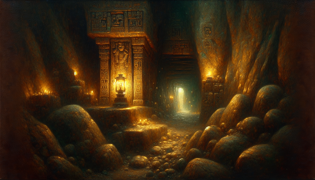
About Story: Muki: The Andean Mine Guardian Dwarf is a Folktale from peru set in the Ancient. This Poetic tale explores themes of Perseverance and is suitable for All Ages. It offers Cultural insights. A haunting Peruvian folktale of a diminutive guardian dwelling in the Andean depths.
Introduction
In the thin air above the Urubamba Valley, miners spoke in hushed tones of Muki. They said his feet were small, his eyes like polished obsidian, and his laughter echoing through tunnels like a distant bell. The first time I heard the story, I was no more than a curious lad, my cheeks kissed by the Andean chill. I leaned against a worn pillar of granite, ran my fingers over carved glyphs as cold as winter’s breath. Pucha, how I shivered. The scent of damp earth mixed with the faint tang of metallic ore lingered heavy in that gloom.
Legends claimed the dwarf‑like spirit guarded veins of silver and gold, allowing only the pure of heart to pass. Some called him the mine’s keeper, others the ghost of greed. Like a moth circling a lantern flame, men risked everything for a glimpse of shining treasure. The narrow corridor ahead seemed endless, as if the mountain itself refused entry. I remember how the drips of underground streams repeated in an uncanny rhythm, resembling a heartbeat.
They say miners who heard a tiny voice chanting in Quechua would uncover secret chambers. Others spoke of tiny footprints in dust as big as a child’s sock, guiding the worthy deeper into labyrinthine shafts. Each tale shimmered like mica flecks in rock, impossible to ignore. I was drawn by equal parts fear and fascination, as if some invisible thread braided with curiosity wound around my very soul.
Thus begins the tale of my encounter with Muki, the stalwart guardian of Andean riches. It is a story of perseverance, where courage seeks reward and superstition meets truth. The mine’s yawning mouth beckoned, and I, trembling yet determined, took my first step into its dusky depths.
The Birth of a Guardian
Long before the Spaniards set foot upon these high plateaus, the Andean spirits roamed freely. In those days, a humble miner known as Tupaq stumbled upon a hidden cavern glittering with silver veins like rivers of moonlight. His heart leapt, but as he reached out, a shrill whistle cut through the air. The cavern walls seemed to contract, and there stood Muki, no taller than a child, garbed in ancient textiles woven from alpaca wool. His skin was the colour of rich loam; his eyes shone brighter than any ore.
Tupaq bowed deeply, muttering the old Quechua greeting. Muki raised a slender hand and produced a tiny wooden flute that sang notes both haunting and sweet. The melody rippled through the rocks like water over pebbles. Scent of cedar smoke drifted in from nowhere, mingling with the earthy musk.
"Ama sua, ama llulla, ama quella," the spirit intoned, invoking the Andean mantra: do not steal, lie, or be idle. In that flute’s voice lay a promise: those who honoured the mountain’s laws would find guidance; those consumed by greed would be lost forever. Like a candle fighting the wind, Tupaq’s resolve glimmered when fear threatened to snuff him out.
Word of Tupaq’s encounter spread across villages. Elders spoke of Muki as custodian of the mountain’s heart. They said each note of his flute framed a covenant between earth and man. Some whispered that in the darkest tunnels, one could smell juniper and hear the chatter of unseen creatures.
Thus Muki emerged from legend into living myth, a sentinel clad in humility yet fierce as a condor guarding its nest. His flute’s echo became a beacon to the worthy and a warning to the unwary.
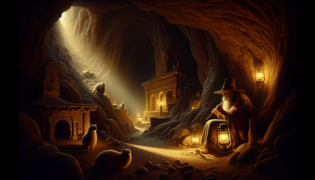
Whispers in the Tunnel
Months later, I followed those murmurs. The tunnel walls glistened, cold and damp, like the belly of a great beast. A distant drip echoed, punctuation in the hush. I crept forward, torch flame flickering, each step stirring motes of dust that danced like golden fireflies.
When I rounded a bend, I saw footprints no bigger than my palm pressing into the soft silt. My breath caught as I uttered, "¡Pucha, será verdad!" My pulse thundered; I almost dropped my torch. The footprints led deeper, toward a narrow shaft where air grew thin and brittle.
I paused. A scuttling sound—like distant coins rattling—resonated in the gloom. My fingers brushed the rough wall, feeling ancient carvings exposed to centuries of moisture. The smell of moss and sulphur tinged the air, sharp but not overpowering. Ahead, the tunnel opened into a chamber dotted with flickering lanterns perched on stone pedestals, illuminating veins of ore that snaked across walls.
From the shadows emerged a figure no larger than a child. His silhouette reminded me of a carved sandal, squat yet sturdy. He wore a cloak made from llama fleece, dyed in muted reds and ochres. His eyes flashed under a battered helmet, glinting like obsidian shards. He brandished a tiny pickaxe in one hand and a lantern in the other. The chamber’s silence deepened, as though even the bats held their breath.
With a voice like distant chimes he spoke in Quechua, "Why tread you here without respect?" Panic and wonder roiled within me like a storm on Lake Titicaca. I bowed, stammered words of apology. The dwarf’s lantern swung, casting dancing shadows upon mineral‑crusted walls.
In that moment, I understood my trespass. This was no mere spirit; it was the mountain’s will made flesh, careful as a shepherd guarding his flock. And I, an outsider, had to prove that my heart sought more than gold.
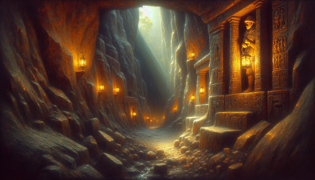
The Trial of Courage
Muki gripped his pickaxe firmly, his eyes narrowing like a jaguar’s before a leap. I swallowed, remembering elder warnings: courage without respect is folly. His tiny lantern quivered, revealing rockfaces adorned with ancient Andean symbols. "Show me your heart," he demanded, voice low as rolling thunder.
He led me along a narrow ledge above a chasm whose bottom was lost in utter darkness. The wind hissed, carrying echoes of unseen creatures. My legs shook like new reeds in a spring breeze. Each step felt like dancing on a blade’s edge, and I tasted grit on my tongue. The weight of the mountain pressed down, as if questioning my resolve.
Huddled against the wall, I recalled the old mantra: Ama quella. No laziness, no half‑measures. Summoning every last spark of will, I placed one foot before the other. Muki’s lantern faintly illuminated my path. When I stumbled, the dwarf reached out, offering a firm but gentle grip. His touch was rough, like unpolished stone, and warm as a midday sunbeam on snow.
Minutes passed like hours. At last, we emerged onto a ledge where silver veins flared beneath a shaft of light. Muki beckoned. In front of us lay a fissure cradled by rock, and inside—glimmering like captured stars—rested a single ingot of pure silver.
"You have walked the mountain’s spine," Muki intoned. "Few dare where others retreat. Claim this token, but carry respect in its weight." A gust rattled our lanterns, and Muki tucked the ingot into my pouch without another word.
The return was silent, each of us transformed. I carried the silver gently, aware it was more than mere metal: it was proof that perseverance could conquer fear.
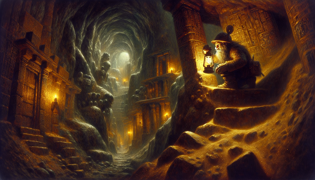
The Pact and the Hidden Vein
Back at the cavern’s heart, Muki invited me to kneel on a smooth slab of granite. He drew lines in dust with his pickaxe—ancient runes telling of a hidden vein deeper still. The air smelled of resin and wet stone. My torch sputtered, sparks drifting like embers falling through water.
He explained, voice soft as owl wings, that the mountain’s wealth was not for hoarding but for sharing. Families in nearby villages starved when seasons failed. The dwarf struck a small stone thrice, and from the wall slid aside a section of rock like a puzzle unlocking. Beyond lay a chamber larger than any cathedral, its walls lined with veins of gold richer than dawn’s first light.
"Share this bounty," Muki commanded, "but disturb not the fragile spirits within." He patted my shoulder, his touch sparking a thrill through my veins. The weight of responsibility settled on me like a woollen poncho in a cold drizzle.
I filled leather satchels with ore, mindful to leave passageways clear and spirits undisturbed. The echo of my hammering interwove with Muki’s quiet humming, a melody of balance between man and mountain. As I worked, I felt the miner’s sweat shining on my brow, salt mingling with dust.
When the haul was ready, Muki raised his lantern high. Dust motes fluttered like golden butterflies in its beam. We emerged into daylight together, the mountain exhaling behind us in a gust that rustled grass and carried a scent of moss and distant firewood.
From that day on, the village thrived. They called me ‘‘El Hijo de la Montaña.’’ And Muki? He vanished into the tunnels, his watchful presence felt whenever miners approached with reverence. The pact held, a testament that true treasure lies in respect, generosity, and the steadfast heart of a soul brave enough to listen to the mountain’s song.
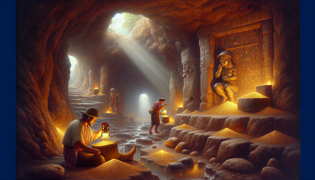
Conclusion
Years have passed since that first descent into the mountain’s core. I carry the memory of Muki’s small frame and unwavering resolve like a talisman wherever I wander. In every village I share not just the gold but the legend, teaching that riches lost to greed vanish like mist at sunrise. "Ama sua, ama llulla, ama quella," I repeat to each eager listener, for that ancient refrain holds more wisdom than a library of scholars. The mountain stands unchanged, its tunnels still humming with hidden promise. On moonlit nights, some swear they hear a faint whistle echoing from the depths, as if Muki’s flute still lingers in the earth’s veins.
I sense the dwarf’s presence whenever I look upon a vein of ore or feel sun-warmed stone beneath my fingers. And when hope seems fickle and dreams tremble like candlelight in the wind, I recall that narrow ledge, the weight of Muki’s pickaxe, and the pact forged in silver and song. Therein lies the greatest treasure: the courage to face the dark and the humility to honour the mountain’s secret heart. May we all walk with respect and perseverance, guided by the tiniest of guardians and the loudest of promises, for the Andes teach that true wealth springs from balance and kindness.

















